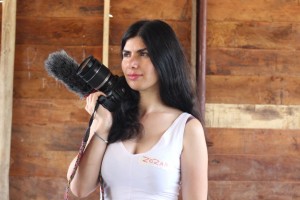Turkey: 29-year-old Kurdish journalist charged with terrorist propaganda
 Zozan Yasar, a 29-year-old Kurdish journalist residing in the UK, has been charged by Turkey with disseminating terrorist propaganda.
Zozan Yasar, a 29-year-old Kurdish journalist residing in the UK, has been charged by Turkey with disseminating terrorist propaganda.
The Turkish Prosecution Services have raised charges against Ms. Yasar, alleging that she has been doing propaganda on behalf of the PKK and KCK, respectively the Kurdistan Workers’ Party and the Kurdistan Communities Union; Turkey considers both terrorist organisations. They cite a picture shared on Facebook by Ms. Yasar in 2018 as proof of evidence, which shows children holding the portrait of a known member of a terrorist group, referring to PKK/KCK, and another picture of a burial place for a member of a terrorist group, draped in the flag of the same group. They furthermore claim that Ms. Yasar has been encouraging violent acts.
The Prosecution Services have carried through with the charges despite Ms. Yasar not having been personally presented with them in order to not prolong their own efforts and concluded that they find her guilty of the charges. They declare that Ms. Yasar will not be allowed to leave the country should she come within Turkish borders and that they will continue to monitor her.
During President Recep Tayyip Erdogan’s incumbency, the word ‘terrorism’ has come to encompass all acts and expressions that can be deemed critical of his rule. In 2016, he stated that the definition of a terrorist should be widened to include journalists, politicians and activists: “It’s not only the person who pulls the trigger, but those who made that possible who should also be defined as terrorists, regardless of their title.” At one point, Turkey was considered the largest prison for journalists and continues to rank at the bottom on lists of countries with freedom of press. The state of Kurdish rights have only continued to deteriorate with the removal of democratically elected Kurdish politicians, imprisonment of Kurdish journalists and members of parliament, closure of Kurdish schools invasion of Rojava and the Kurdish region in Syria.
It is not the first time that Ms. Yasar has been harassed by the Turkish authorities. She has previously been accused of disseminating ‘terrorist propaganda’ when she was working as a teacher the Kurdish Institute in Amed (Diyarbakir), the unofficial Kurdish capital of southeastern Turkey. Alliance for Kurdish Rights interviewed her to share her thoughts on the charge raised against her by the Turkish state, as it has done against so many other Kurds who are speaking their mother tongue and resisting the government’s attempts to quell the Kurdish identity.
Alliance for Kurdish Rights (AKR): Can you tell us a little about your background?
Zozan Yasar (ZY): I was born in Amed, Turkey in 1990. The 90’s were a difficult time of repression for the Kurds in Turkey. 3000 villages had been razed or forcibly evacuated by the state, as well as thousands of forced disappearances and executions of political activists and dissidents. Growing up in this environment meant I did not have access to education and was entirely self-taught until I reached the age of 15 where I enrolled in distant study school with yearly exams. At 18 I began teaching Kurdish at the Kurdish Institute in Amed. I was first arrested when I was 22 years old on charges of disseminating ‘PKK propaganda’. After the release I attended the University of Istanbul to study Political Science and International Relations. During my time at the University of Istanbul I was involved in a lot of activism for human rights, women’s rights, and I eventually began a career as a journalist for Voice of America – Kurdish service.
AKR: Why is the Turkish government accusing you of disseminating terrorist propaganda?
ZY: Since leaving Turkey in 2017 this is the second time I’ve been charged without any new evidence. It isn’t legal to charge someone without taking a statement from them first for evidence. The state categorises those who stand up for human rights as terrorists. Especially as a Kurdish person, it is not easy in the face of the accelerating crimes committed by the Turkish government. This is especially explicit in the way the Turkish state treated those who protested the invasion of Rojava in Turkey. There was widespread censoring and detainment of individuals deemed a ‘threat’ to the Turkish state by association with the Kurdish movement and Rojava.
AKR: Have you experienced family members or friends going through the same?
ZY: Absolutely! Since the coup attempt in 2016 many of my family and friends have been charged by the government and most have fled the country fearing for their freedom and safety. During the post-coup crackdown the Turkish government shut down 174 media outlets and several social media platforms as well as Wikipedia to disrupt civilian opposition. Many academics were arrested, with over 1000 people losing their jobs. Of these people, many had their passports cancelled to prevent them leaving the country. 150 journalists are still in Turkish prisons for calling into question the actions of the Turkish government. The Turkish government has stripped its citizens of fundamental human rights and the number of people leaving the country is at the highest levels since the 1980 coup attempt. These are shocking statistics for a NATO country in the 21st century.
AKR: How will you respond to the charges?
ZY: As of now I have been banned from my country and prevented from seeing my family. The only option left to me is to continue fighting and bringing the spotlight on the tragedies happening in Turkey. I will continue engaging in activism and fighting for political justice and human rights for those in Turkey, my friends and family, who no longer have the ability to do so.
Official charges translated by Asli Kücukyildiz.
Comments are closed.